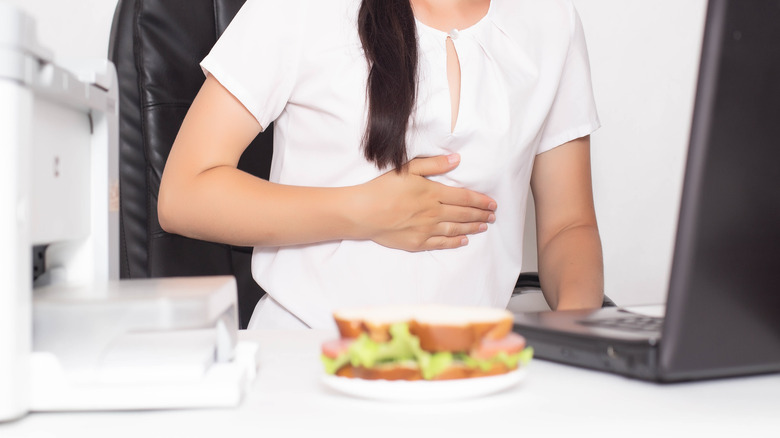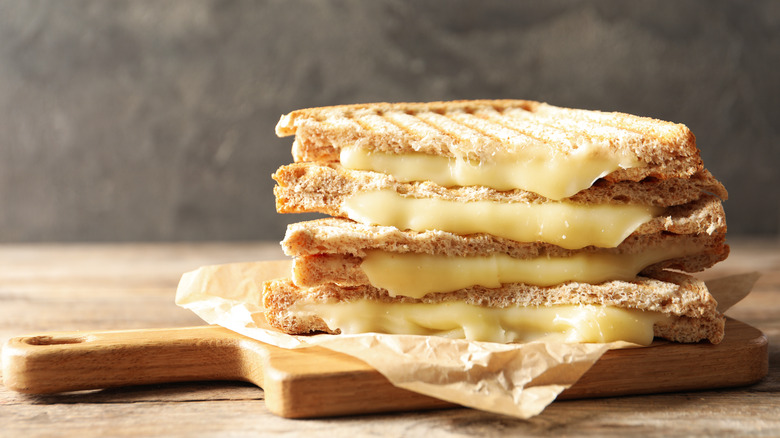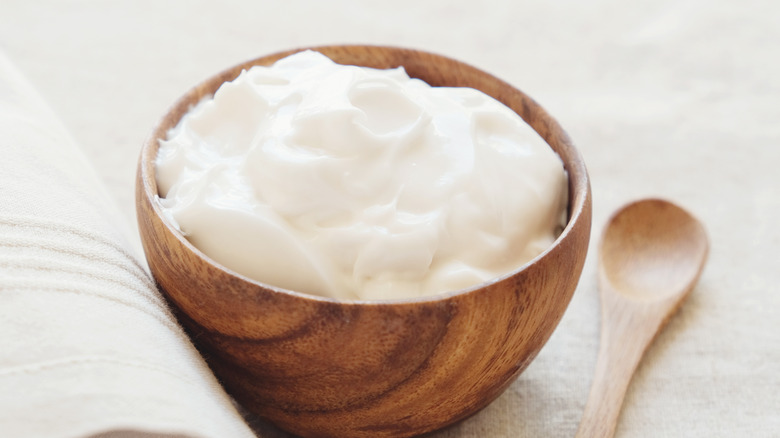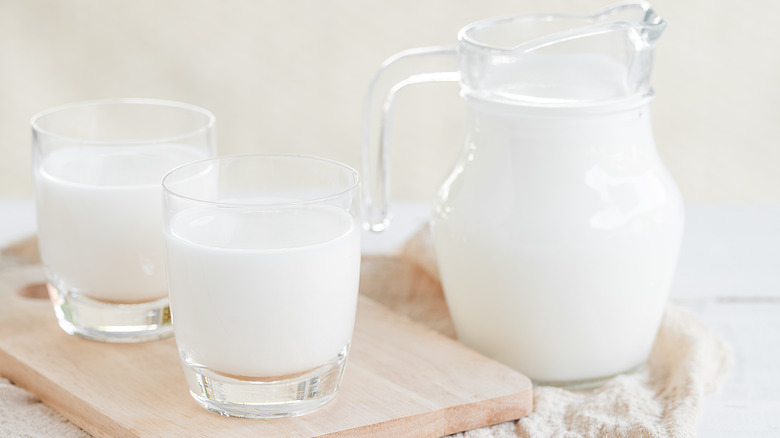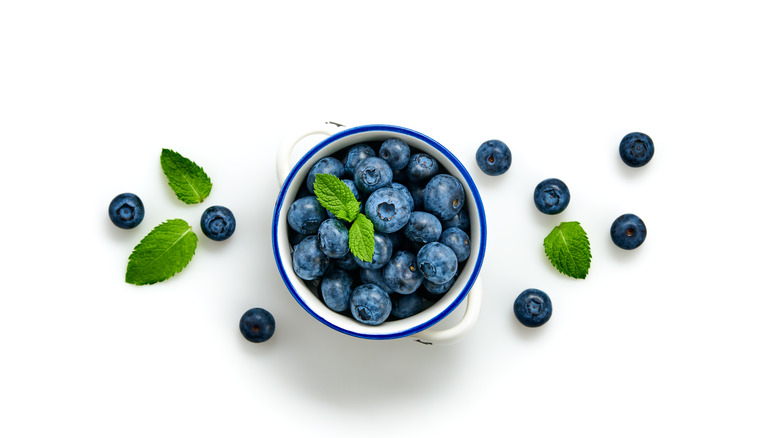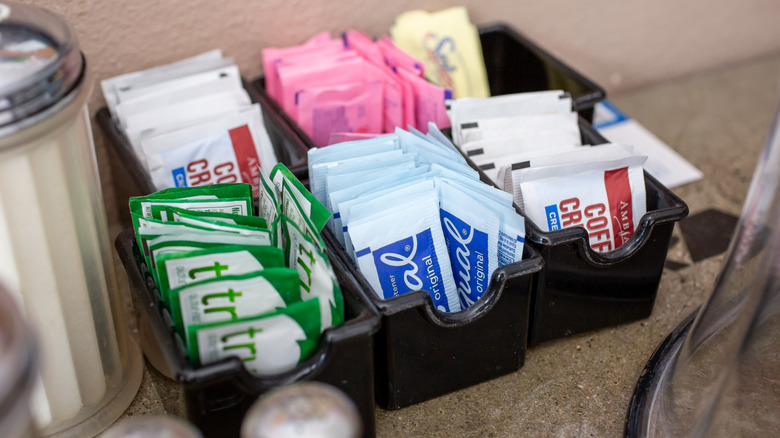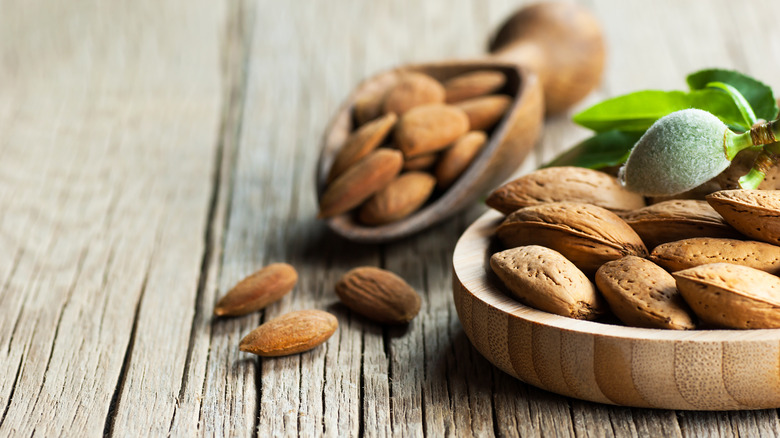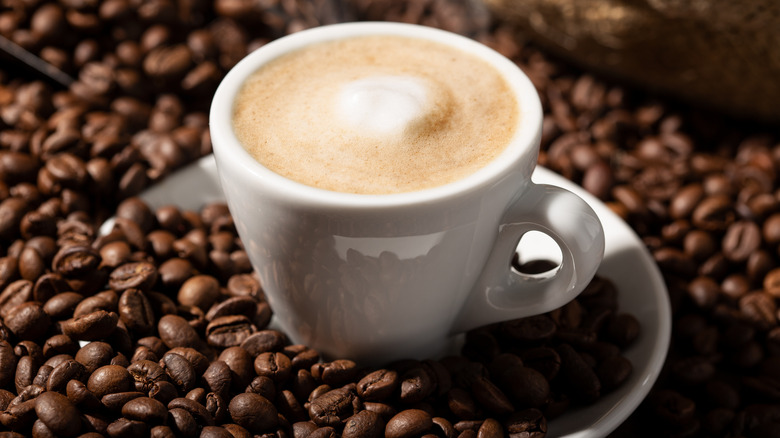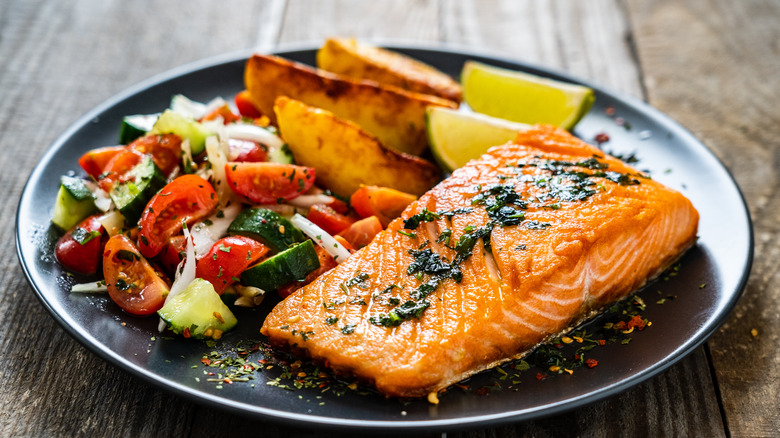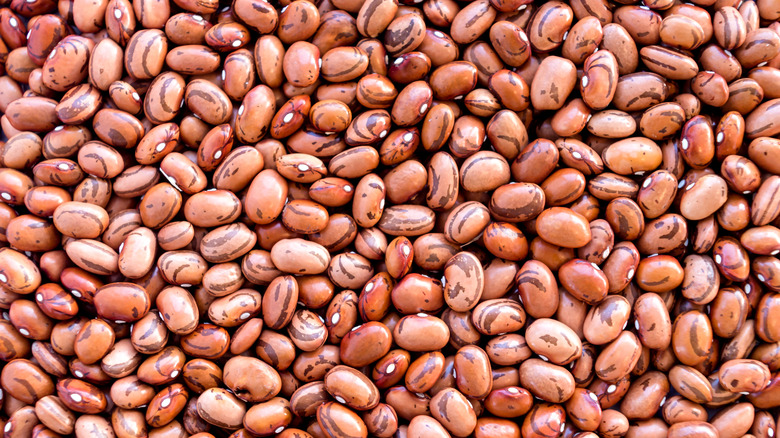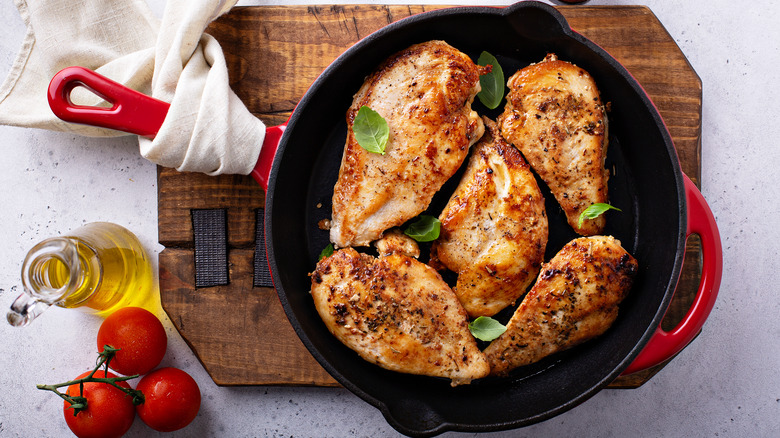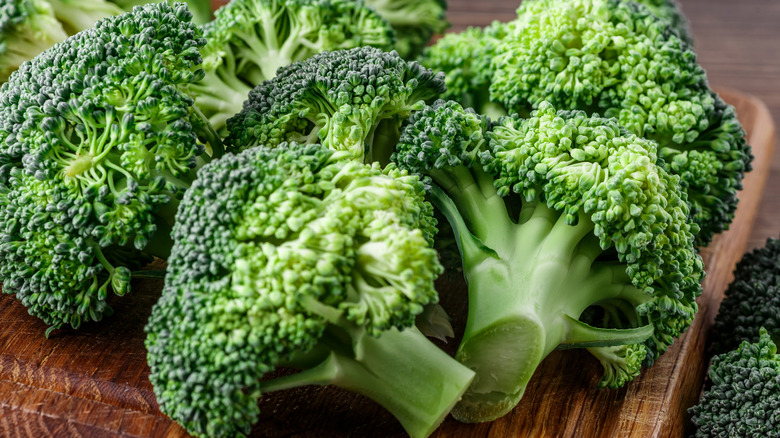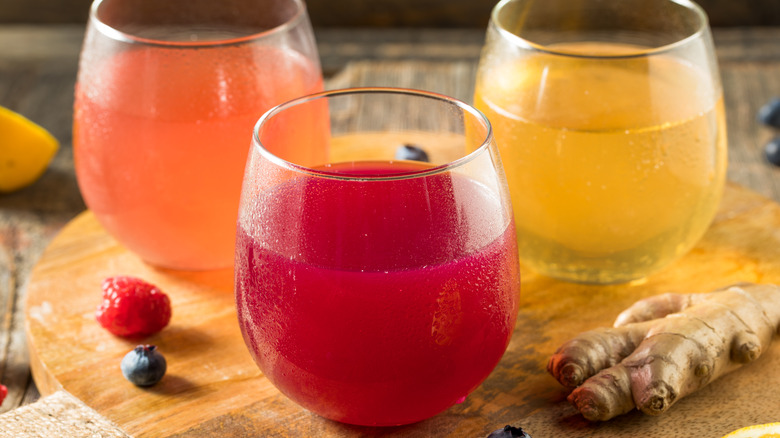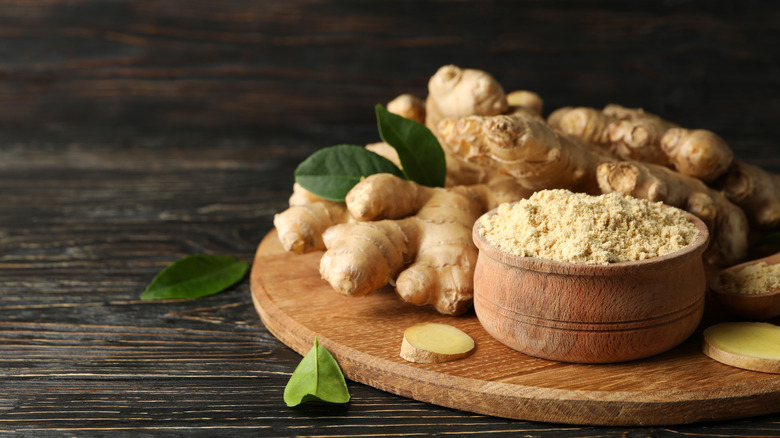7 Foods To Eat And 7 To Avoid When You Have IBS
Affecting between 25 and 45 million people in the United States alone, IBS (irritable bowel syndrome) is one of the most common gastroenterological diseases diagnosed by medical professionals (via American College of Gastroenterology). This disease is characterized by bloating, abdominal pain, and oftentimes either diarrhea or constipation (or sometimes both), and impacts the connection between the brain and the gut. Anyone can have IBS, but most people who are diagnosed are under the age of 50.
Although stress can certainly trigger or exacerbate IBS symptoms, it is not one of the common causes. There have yet to be enough solid conclusions on the exact causes of IBS, but research shows that diet is one of the most important factors in fighting the uncomfortable symptoms of this disorder (via National Institute of Diabetes and Digestive and Kidney Diseases). That is why we've put together a list of the seven foods to avoid and seven foods that are safe and healthy to consume when you have IBS.
Avoid: Bread
If you are experiencing symptoms of IBS, chances are that bread and other gluten-filled products might make things worse. IBS is extremely common among Americans, and many of its symptoms can be found in other gastrointestinal issues as well. For example, there is often a crossover between irritable bowel syndrome and celiac disease or non-celiac gluten intolerance because of symptoms like bloating, diarrhea, abdominal pain, or constipation, according to a 2015 review in Nature. In fact, it is common for people to be misdiagnosed with IBS when they actually have celiac or something similar.
According to the review, there is no guarantee that eliminating gluten will relieve symptoms of IBS, but you may find it helpful. This is especially true for people experiencing intense diarrhea with their IBS. If you're experiencing IBS symptoms, consult your doctor and ask if eliminating bread and other gluten products could ease your symptoms.
Eat: Greek Yogurt
IBS is a gastrointestinal disorder that affects the GI tract functions, and it is believed to impair the signals that are sent between the brain and our small and large intestines, according to a 2015 study published in the Journal of Neurosciences in Rural Practice. This is why it is important to eat foods that help bring strength back to the gut. One of the cheapest and most simple ways of doing this? Eat yogurt with live active cultures (via Eat This, Not That). Greek yogurt is especially helpful because it usually contains the lowest amounts of sugar.
Yogurt contains probiotics, which are live active cultures, or bacteria, that resemble the ones found in our gut and GI tract. Because of this, probiotics are extremely helpful in relieving symptoms of IBS. They help patients with IBS by protecting against harmful bacteria and creating a sort of "mucus" that strengthens the inner lining of the gut, one study explained. That may sound gross to some, but it's a necessary function in fighting abdominal pain and consistent diarrhea, as well as helping IBS patients get back to a regular bowel movement schedule. If dairy yogurt isn't your thing, you can also find probiotics in certain coconut yogurt or other non-dairy yogurts.
Avoid: Lactose
It is commonly suggested that people with IBS try a lactose-free diet. Experts believe that there is not sufficient enough evidence to suggest this as a clinical-proven solution to IBS, but there appears to be an important overlap between lactose-intolerance symptoms and those of IBS. It is worth noting that people with lactose intolerance and IBS experience very similar symptoms such as diarrhea and abdominal cramping.
According to a research review published by the California Institute of Behavioral Sciences & Psychology Channel, it is extremely difficult to distinguish patients with lactose intolerance from patients with IBS. This would explain why it could possibly help those with IBS symptoms to try a lactose-free diet to see if any alleviation is provided.
Unfortunately, more research between lactose intolerance and IBS still needs to be done in order to justify the removal of lactose as a proven suggestion. However, there have been a significant amount of clinical trials done that have shown improvement of IBS symptoms after avoiding lactose. And a study in the Journal of Health, Population, and Nutrition found that the prevalence of lactose intolerance was in fact higher in people who experience IBS.
Eat: Blueberries
A possible solution for IBS symptoms that has gained popularity over the last few years is called the low-FODMAP diet. Originally created in Australia, this diet stands for foods that are low in "fermentable oligosaccharides, disaccharides, monosaccharides, and polyols" (via MedicineNet).
Foods that are high in FODMAPs are known to create harmful bacteria, bowel liquid, and bloating. This is because the small intestine has trouble digesting FODMAPs. According to Harvard Health, it has been found that 76% of patients with IBS felt relieved symptoms after following a low-FODMAP diet.
So what are some common FODMAP-containing foods that could be exacerbating your IBS symptoms? Cow's milk, apples, broccoli, asparagus, soy products, and chickpeas are just a few examples. But fear not! There are plenty of foods that are low in FODMAPs. One popular example is blueberries. This sweet fruit helps stabilize your levels of FODMAPs and can help you get your daily levels of sugars and carbohydrates, without harming your gut (via Harvard Health).
Avoid: Artificial sweeteners
Artificial sweeteners, which you'll find in things like diet soda and items advertised as "sugar free" are known as polyols. Polyols make up the "P" in FODMAP, which is a common discussion among people trying to relieve their symptoms of IBS. Although there is no reason to completely eliminate polyols from your diet, you may find lowering your consumption to have a positive impact on your gut (via Michigan Medicine).
When your gut bacteria is off balance, you can experience harsh symptoms such as diarrhea, constipation, and abdominal pain. According to a research review in Advances in Nutrition, more studies need to be done to find a direct correlation between IBS and artificial sweeteners. This review states that there is not enough research on how artificial sweeteners directly impact the gut microbiome, but research has been done on the effects of a low-FODMAP diet on gut health.
One small study published in 2014 found that after one week of ingesting fairly high amounts of Sweet 'N Low, four out of the seven participants reported digestive issues. Again, it is clear that much more research needs to be done, but lowering your intake of polyols could just help improve your gut health.
Eat: Almonds
According to Johns Hopkins University, FODMAPs are short-chain carbohydrates that can cause a high level of digestive and intestinal stress. Gastroenterologist Hazel Galon Veloso, told the university that is only a temporary eating plan, however. The suggestion is to eliminate all FODMAP-containing foods (or as many as you can) from your diet should last "only two to six weeks," said Veloso.
After this period of elimination, you can start adding certain foods back in to see if any irritation occurs. Veloso continued, saying, "Every three days, you can add a high FODMAP food back into your diet, one at a time, to see if it causes any symptoms. If a particular high FODMAP food causes symptoms, then avoid this long term."
Certain snacks and cow's milk are high in FODMAPs and should be limited during this time, but almonds and almond milk are considered low in FODMAPs. If you're trying to avoid sugary snacks or dairy products, try replacing these with an almond snack, almond butter, or almond milk.
Avoid: Caffeine
Okay, so you may not need to entirely avoid caffeine, but it's recommended that you limit your intake if you're experiencing IBS. According to research published in the World Journal of Gastroenterology, caffeine should be consumed in considerable moderation. Or, if your symptoms are severe, you should consider avoiding it entirely (via Everyday Health).
Johns Hopkins University says that caffeine can exacerbate IBS symptoms, especially those related to diarrhea. According to the university, "High sources of caffeine include coffee, tea, cola drinks, chocolate and over the counter headache pills such as Excedrin." This has a lot to do with the fact that caffeinated drinks like coffee have been proven to speed up bowel movements, which can potentially cause an issue in those with existing IBS symptoms. There is some research on this, including a study published in the British Medical Journal, but much more still needs to be conducted.
Eat: Fish
IBS reportedly affects 5 to 15% of the current general population. Because of its increasing prevalence, more and more research is being done to get to the bottom of its causes. According to a 2016 report published in the Journal of Nurse Practitioners, medical professionals and researchers are beginning to pay much more serious attention to the role that diet plays on IBS symptoms in patients.
The JNP states that more research needs to be done on finding the levels of recommended fat in a diet that would help alleviate IBS symptoms. But for some patients with IBS, it is helpful to avoid very fatty foods. However, instead of opting for foods that have been processed to be low in fat, the journal advises choosing "healthy and naturally lower-fat foods" like fish. And since fish contain omega-3s, which combats inflammation, it may also help ease your IBS symptoms, Verywell Health explained.
Avoid: Legumes
Legumes are an example of that food group that people may assume are always beneficial because they are "natural," but, unfortunately, legumes can sometimes create issues for our digestion. Legumes include kidney beans, split peas, lima beans, black beans, chickpeas, black-eyed peas, and peanuts, among others.
The reason legumes can be harmful to those with IBS is because of the way the body absorbs them. According to a 2015 study in the Nutrition Journal, these foods can negatively impact the intestines once they enter the small intestine and colon. From there, they reach what is known as the large intestine lumen, which is the opening inside the bowels that is surrounded by the intestinal wall. When legumes (high-FODMAP foods) reach the lumen, they can sometimes create too much bacterial fermentation. This process can lead to abdominal pain and bloating and can lead to particularly uncomfortable symptoms for those with IBS (via Healthline).
Eat: High-protein foods
It's easy to get overwhelmed when it comes to choosing a helpful diet that will combat IBS. The Canadian Society for Intestinal Research states that IBS affects everyone differently, and therefore solutions to IBS symptoms may be different for each individual. The good news for all the carnivores out there is that meat is almost always safe to eat for those with IBS symptoms. If you are balancing your diet with three meals a day, a lot of fiber, and sticking to low-FODMAP foods, the CSIR says you can enjoy all the meat you want!
A report in the World Journal of Gastroenterology agrees, saying it's helpful to consume meat, fish, and eggs — though the researchers recommend doing so in moderation. Their specific recommendation for people with IBS is to consume two to three servings of high-protein foods (meat included) per day. Again, as long as you're balancing out the types of meat you're eating and switching between other types of low-FODMAP foods, then you can rest assured that meat won't make your symptoms worse.
Avoid: Cruciferous Vegetables
Cruciferous vegetables are known to be harmful to those who are struggling with IBS or certain related symptoms. The first question someone may ask, though, is "what is a cruciferous veggie?" We hear you.
According to the National Cancer Institute, cruciferous vegetables are part of the Brassica plant family and are rich in vitamin C, E, K, folate, and fiber. Although these vegetables can be a part of a healthy diet, they are also high in FODMAPs, which we know can cause problems for those with IBS. These veggies include broccoli, cabbage, kale, bok choy, arugula, and cauliflower.
The Cleveland Clinic says that these vegetables can cause uncomfortable amounts of gas and bloating, as well as "abnormal bowel habits." It's still important to eat plenty of vegetables and greens when dealing with IBS, however, so the Cleveland Clinic suggests trying some variations that are easier on the gut. This includes veggies like squash, zucchini, eggplant, spinach, celery, and green beans.
Drink: Kombucha
Kombucha is crisp and refreshing, but it's also great for easing IBS symptoms. This fermented tea drink is full of probiotics, which are helpful in repairing the gut microbiome. This is important because IBS may stem from an "overgrowth of bacteria," according to Healthline. The microbiome is full of both pathogenic and symbiotic organisms who live in balance with one another, per The Nutrition Source, a Harvard publication.
So how does a probiotic drink like kombucha help? According to a report in the World Journal of Gastroenterology, probiotics are proven to help regulate the microbiota in our bodies, which directly impacts our gut health. However, Verywell Health does recommend that people with IBS choose a type of kombucha without a high amount of sugar. Additionally, as the study revealed, consuming probiotics too often or in very large quantities could potentially have a harmful impact. Consult a medical professional if you're interested in trying a regular consumption of probiotics.
Avoid: Alcohol
There have been reported correlations between heavy alcohol consumption and IBS, although more research may need to be done. In a study published in Medicine, excessive alcohol consumption (more than seven drinks per week) led to increased chances of IBS in women. But do moderate to light amounts of alcohol negatively affect IBS? The short answer is ... maybe.
Although research on a direct connection between moderate to light alcohol consumption and IBS is inconsistent, there is some research that says alcohol consumption can cause diarrhea or irregular bowel movements (via Medical News Today). This can be especially uncomfortable for those with IBS symptoms of diarrhea.
A study in the American Journal of Gastroenterology found that there was more of a connection between alcohol consumption and those with diarrhea-predominant IBS than there was with IBS constipation symptoms. It was also found that the effects of drinking on the GI tract were more intense the day after.
Eat: Ginger
Ginger is an incredibly popular spice that has been used across the globe for thousands of years. This spice is yielded from a rhizome, which is an underground plant. Ginger is extremely powerful and has been used for many different medicinal purposes, which includes aiding in gut and digestive health.
The Journal of Food Science & Nutrition reports that ginger is made up of 400 different compounds and can be extremely therapeutic to our bodies, especially to those who have IBS. The compound makeup of ginger is mostly carbohydrates, with lipids, terpenes, and phenolic compounds as well. Aside from these compounds, ginger also contains things like protein, fiber, vitamin A, and powerful minerals.
Although more research needs to be done to see the direct impact that ginger has on patients with IBS, the report by Food Science & Nutrition shows there is no doubt that ginger soothes those with high levels of gastrointestinal discomfort. You may not find that ginger can completely heal IBS, but it will help alleviate the painful symptoms.

